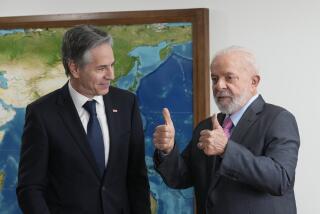A U.S.-Brazil respect deficit
- Share via
Brazil’srising stature and influence will be on display when President Dilma Rousseff arrives in Washington this week — as it was when President Obama visited Brazil one year ago, accompanied by his top economic advisors, including several Cabinet members, and about 50 chief executives from the largest U.S. companies. The conundrum that faces the two governments is how to turn what both agree is a critical relationship into a productive and cooperative one.
Brazilians and Americans talk a great deal about the desirability of a “strategic” relationship between their countries, but neither does much to achieve it.
The economic benefits should be obvious. Brazil’s economy is now the sixth largest in the world, advancing from 12th in 2004. Sometime after 2040 it will be fourth — behind only the U.S., China and India. Year by year, Brazil absorbs increasing amounts of U.S. investments and exports, and recent oil discoveries should turn Brazil into a major U.S. energy supplier.
Today, China is Brazil’s major trading partner, but U.S. trade with Brazil is also flourishing, expanding almost 10% a year during much of the past decade. The $15-trillion U.S. economy is an essential market for Brazil’s industrial production and the primary source of foreign capital and new technologies needed for longer-term growth and productivity.
Yet the U.S. and Brazil have not signed a single major economic pact for two decades — a period when Washington reached trade accords with 11 other Latin American countries. Nor have the U.S. and Brazil cooperated effectively in global or regional economic forums. Fundamental differences remain unresolved on several highly contentious issues: U.S. tariffs and subsidies that block Brazilian agricultural sales, Brazil’s import barriers to services and manufactured goods, and deep discord over intellectual property. The prospering bilateral economic ties that exist reflect the energy and initiative of business and financial communities, not the two governments.
But beyond disagreements on economic issues, U.S.-Brazil relations are strained by geopolitical tensions. Particularly galling for Brazil has been Washington’s reluctance to support its bid for a permanent seat on the U.N. Security Council, even though President Obama gave U.S. backing to India two years ago. For its part, Brazil has pursued its global aspirations largely by standing apart from the U.S. and emphasizing its differences on critical regional and world issues, most disturbingly on Iran’snuclear program.
Washington hoped Rousseff, who took office in January 2011, would set a new tone by initiating a more pragmatic and moderate foreign policy than that of her flamboyant predecessor. There have been differences, but they are modest, and the U.S. has not responded to the changes in any significant way.
No one anticipates that the Brazilian president’s visit will alter bilateral relations in any substantial way.
Still, it is time for the U.S. to consider dropping its ambivalence over Brazil’s international ambitions and acknowledge — more than halfheartedly — its emergence as a powerful nation. The U.S. should support Brazil’s pursuit of a Security Council seat (which Brazil will almost surely occupy within several years). There is no good reason for Washington to continue favoring India over Brazil. Brazil does not have an untarnished record on foreign policy, but it has a better profile than India on most global questions that concern the U.S. — including the Middle East generally. And Brazil could play a helpful role in negotiations on these issues because it enjoys the confidence of many countries that remain wary of the United States and its European allies.
Brazil has made clear it would welcome U.S. assistance to create a robust scientific and technological industry. Although Washington says it wants to be helpful, its efforts have been modest and lackluster. Again, India provides a model. A U.S.-Brazil accord, similar to Washington’s 3-year-old nuclear technology agreement with New Delhi, would contribute greatly to Brazil’s development of a world-class nuclear energy industry, and might be the best way to secure Brazil’s active support for nonproliferation initiatives.
The two countries need to be more respectful of each other. Frequently, the U.S. treats Brazil as an interloper in world affairs, which does not match the status it has achieved. For its part, Brazil seems intent on demonstrating its influence by flaunting its independence of the U.S. and, on many issues, showing off its opposition, even when bedrock U.S. interests are at stake.
Changes in approach would benefit both nations. For now, however, they seem comfortable with the status quo, with two governments tolerating and accommodating each other, while maintaining their distance. Unfortunately, neither is prepared to invest very much in building a more robust relationship.
Peter Hakim is president emeritus of the Inter-American Dialogue, a Washington-based think tank.
More to Read
A cure for the common opinion
Get thought-provoking perspectives with our weekly newsletter.
You may occasionally receive promotional content from the Los Angeles Times.









